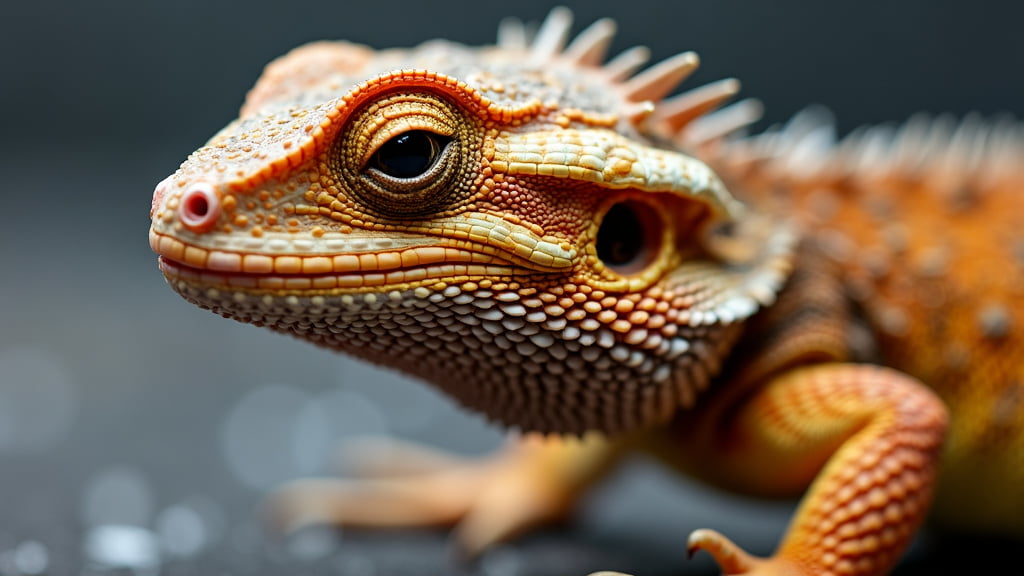Imagine this: Your bearded dragon watching you closely while you munch on a crunchy carrot. Those little eyes blinking, head tilted slightly, and if they could talk, they’d probably ask, “Hey, is that for me?” As a responsible pet owner, you might wonder, “Can bearded dragons eat carrots?” Let’s find out if carrots are a good treat for your scaly friend.
When I first gave a carrot to my dragon, Fluffy, I wasn’t sure if he would like it. He stared at it, poked it with his snout, and finally took a tiny bite. To my surprise, he ate the whole piece! Mission “introduce carrots” was a success. But is it safe? Is it nutritious? Let’s dive deeper.
Understanding the Nutritional Content of Carrots
Before we get too excited, it’s important to know what’s in a carrot. Carrots are known for being packed with:
- Vitamins: Carrots have Vitamin A (good for eye health), Vitamin C (boosts the immune system), and Vitamin K (helps with bone health).
- Minerals: They include potassium (helps with muscle function) and calcium (important for strong bones).
- Fibre and Water: Carrots are high in dietary fibre and also provide hydration because they have a lot of water.
Seems pretty healthy for us, but what about for bearded dragons? Let’s find out.
The Bearded Dragon Diet
Natural Diet
In the wild, bearded dragons have a varied diet. They eat:
- Insects: Beetles, crickets, and other small critters make up a big part of their diet.
- Vegetation: They also eat leaves, flowers, and other plant-based foods.
Domesticated Diet
For pet bearded dragons, their diet usually includes:
- Staple Greens: Collard greens, dandelion greens, and mustard greens, which provide essential nutrients.
- Occasional Fruits and Vegetables: Blueberries, apples, and yes, sometimes carrots.
It’s important to replicate their natural diet as much as possible to keep them healthy and happy.
Carrots in Your Dragon’s Diet
Benefits
Introducing carrots to your dragon’s diet can have some benefits:
- Vitamin A for Eye Health: This helps in keeping good vision.
- The extra crunch adds variety to their diet, and the water in carrots provides additional hydration.
Risks
However, carrots can have some drawbacks:
- High Vitamin A Toxicity: Too much Vitamin A can lead to Hypervitaminosis A, which is toxic for bearded dragons.
- Calcium to Phosphorus Ratio Imbalance: Carrots have more phosphorus than calcium, which can be problematic if eaten in large amounts.
How to Safely Feed Carrots to Your Bearded Dragon
Preparation
Making sure carrots are safe for your dragon is crucial. Here’s how you can prepare them:
- Cooking vs. Raw: Raw carrots are usually better, as cooking can reduce their nutritional value. But lightly steaming them can make them easier to digest.
- Cutting into Appropriate Sizes: Always cut the carrot into small, manageable pieces to prevent choking.
Frequency
Carrots shouldn’t be a regular part of your dragon’s diet. Offering carrots once or twice a week as a treat is ideal.
Portions
When it comes to portions, less is more. A small piece of carrot is enough for one feeding.
Alternative Vegetables and Fruits
While carrots are a nice change, there are other safe options to consider:
Safe Vegetables
- Butternut Squash: A great source of vitamins and easy to chop into small pieces.
- Bell Peppers: Crunchy and full of nutrients.
Safe Fruits
- Blueberries: Full of antioxidants and perfect for a sweet treat.
- Apples: Slice them thinly and remove the seeds before feeding.
Observing Your Bearded Dragon’s Health
Signs of Well-being
It’s important to keep an eye on your dragon’s health. Signs that your dragon is doing well include:
- Active Behaviour: A healthy dragon will be lively and curious.
- Clear Eyes and Regular Shedding: These are signs of good health and proper nutrition.
Warning Signs
On the flip side, watch out for the following:
- Lethargy: A sluggish or inactive dragon may be unwell.
- Swelling or Unusual Stool: These signs can indicate dietary issues or illness and should be checked by a vet.
Conclusion
So, can bearded dragons eat carrots? Carrots can be a safe addition to your bearded dragon’s diet if given occasionally and in small amounts. Their nutritional benefits, like Vitamin A, can be useful, but the risks of overfeeding, like Vitamin A toxicity, mean carrots should be an occasional treat, not a staple.
Always watch your dragon’s health and talk to a vet before making any big changes to their diet. A balanced and varied diet is key to keeping your dragon happy and healthy.
From my experience, Fluffy loves his carrot nibbles now and then, but I make sure to balance them with other safe veggies and greens. Your dragon deserves the very best, and with a bit of care, their diet can be both nutritious and exciting.
We’d love to hear about your experiences and any questions you might have in the comments below. Let’s keep our dragons munching happily! And don’t forget to check out more tips and advice on bearded dragon care right here at Dug’s Bugs.

